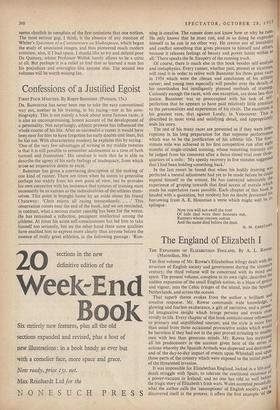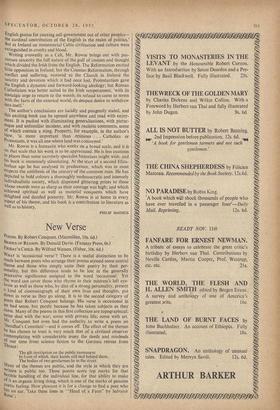The England of Elizabeth I
THE EXPANSION OF ELIZABETHAN ENGLAND. By A. L. Rowse' (Macmillan, 30s.) THE first volume of Mr. Rowse's Elizabethan trilogy dealt with thre . structure of English society and government during the sixteenu,: century; the third volume will be concerned with its mind an spirit. The present volume, complete in its own right, describes the sudden expansion of the small English nation, in a blaze of genius and vigour, into the Celtic fringes of the island, into the Spills', Netherlands, and across the oceans. That superb theme evokes from the author a brilliant and creative response. Mr. Rowse commands wide knowledge, a glowing and fearless exuberance, a gift of narrative, and a power; ful imaginative insight which brings persons and events ril°5 vividly to life. Every chapter of this book contains some reference: to primary and unpublished sources; and the style is more free than usual from those occasional provocative asides which 00d ,', be harmless if they had not in the past proved irritating to smaller men with less than generous minds. Mr. Rowse has surpassed
' all his predecessors in the account given here of the series 0,
,', actions whereby the Spanish Armada was dispersed and destroYe° and of the day-to-day impact of events upon Whitehall and uP°",,, ,those parts of the country which were exposed to the initial pun'" of the threatened invasion. It was impossible for Elizabethan England, locked in a life-and; death struggle with Spain, to tolerate the continued existence o' a power-vacuum in Ireland; and no one has told so well before the tragic story of Elizabeth's Irish wars. Wales accepted peacefully what the author calls the 'assumptions' of English society, and it ,, discovered itself in the process; it offers the first example 'of tiP
English genius for coaxing self-government out of other peoples— the cardinal contribution of the English in the realm of politics.' But in Ireland an immemorial Celtic civilisation and culture were extinguished in cruelty and blood.
Writing avowedly as a Celt, Mr. Rowse brings out with pas- sionate sincerity the full nature of the gulf of custom and thought Which divided the Irish frOm the English. The Reformation excited little opposition in Ireland, but the Counter-Reformation, through conflict and suffering, restored to the Church in Ireland the sanctity and devotion which it had once lost. Protestantism gave the English a dynamic and forward-looking ideology; but. Roman Catholicism was better suited to the Irish temperament, `with its nostalgic urge to return to the womb, its refusal to come to terms with the facts of the external world, its deepest desire to withdraw into itself.'
The author's conclusions are lucidly and pungently stated, and this exciting book can be opened anywhere and read with enjoy- ment. It is packed with illuminating generalisations, with pictur- esque and unfamiliar incident, and with realistic comments, some of which contain a sting. Property, for example, in the author's View, 'is more important than opinions . . . Catholics or Protestants, it was all one where land was concerned.'
Mr. Rowse is a humanist who works on a broad scale, and it is on that scale that his work is to be appreciated. He is less cautious in places than some narrowly specialist historians might wish, and his book is immensely stimulating. At the start of a second Eliza- bethan age he has analysed its predecessor, which was in most respects the antithesis of the century-of the common man. He has depicted in bold colours a thoroughly undemocratic and intensely individualistic society, which dispensed glittering prizes to those whose swords were as sharp as their courage was high; and which achieved spiritual as well as material conquests which have delighted and dazzled posterity. Mr. Rowse is at home in every aspect of his theme, and his boOk is a contribution to literature as well as to history.
PHILIP MAGNUS



































 Previous page
Previous page